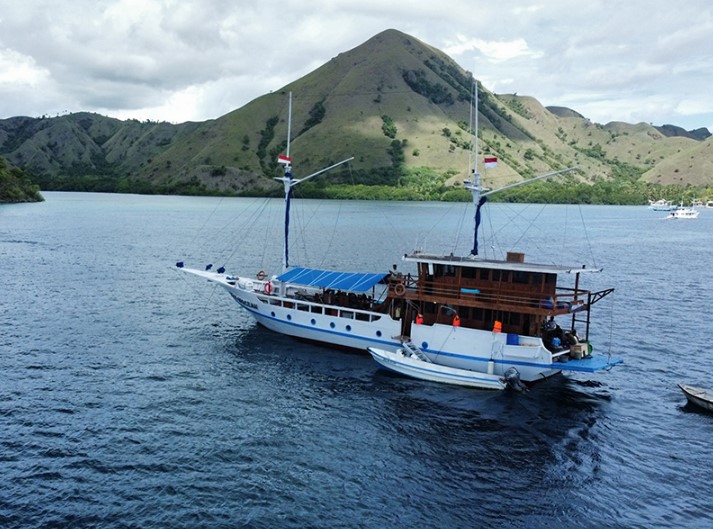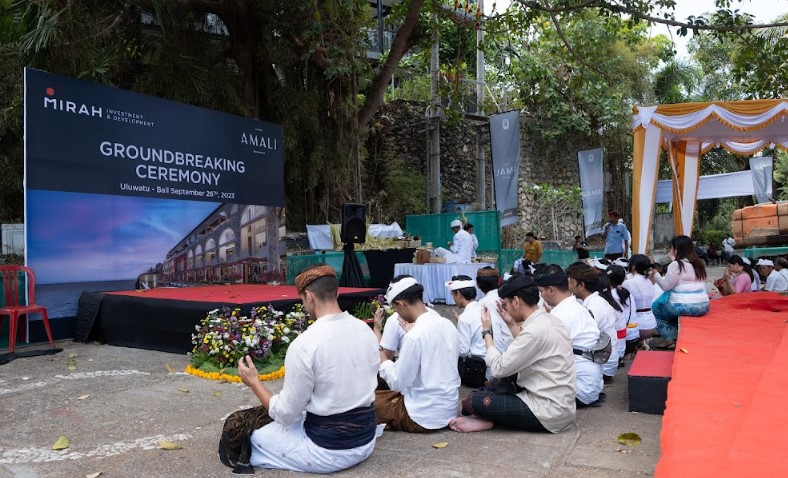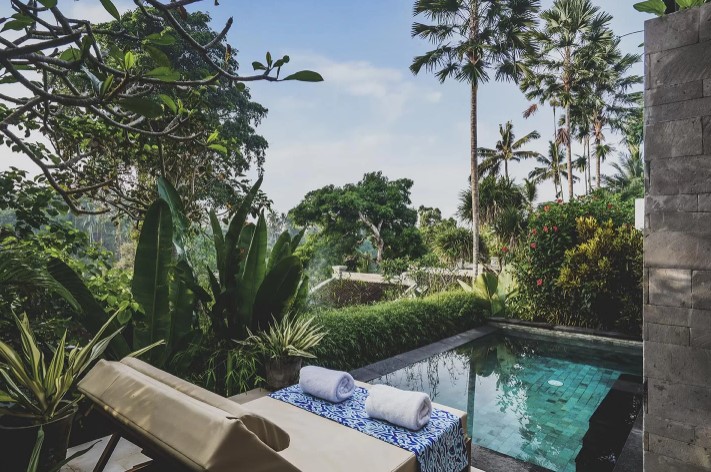Bali—the Indonesian island of Hindu temples, jungles, and beaches I’ve called home on and off for five years—is renowned for its rich cultural and spiritual life and natural beauty. It also has a trash problem. I’ve seen subak rice irrigation canals congested with plastic rubbish and have paddled into inorganic debris while surfing. Contributing factors include a lack of a centralized waste management or recycling system, overtourism with rampant use of single-use plastic, and no enforcement on littering.
Since 2019, the Balinese government has implemented a handful of single-use plastic bans that have mostly been ignored. But several eco-minded local organizations and businesses have begun to lead their own grassroots efforts. They include NGO Plastic Exchange, which trades rice for recyclable plastic waste with local families in need, and Sungai Watch, which organizes river and coastal cleanups. (It estimates that only 4 percent of all plastics on Bali are recycled.) Joining the cause are several boutique hotels, which are creating waste-reduction measures and new uses for trash and plastic, all designed to rectify decades of damage while introducing guests to hands-on experiences that raise awareness.
“We used to think differently about waste and disposal,” regenerative tourism consultant and permaculture designer Silvina Miguel told me recently; we met at Alila Villas Uluwatu, one of her clients. “Now we’re thinking in a circular economy. We have to be really creative. Each element of waste can be a collaboration, a new opportunity, a new product—everything tells a different story.”
I checked into the following three Bali resorts to see how they are turning waste reduction and recycling into a creative endeavor.

Desa Potato Head turns colorful plastic trash into high-design furniture, jewelry, and more.
Courtesy of Desa Potato Head
Desa Potato Head
The resort
In the Petitenget neighborhood of busy Seminyak on the island’s western coast, Desa Potato Head consists of two hotels and a handful of restaurants. It began in 2010 with the debut of the now-iconic Potato Head Beach Club (with its dependably megawatt DJ lineup), which sits behind a mosaic of 6,600 recycled wooden shutters. Indonesian architect Andra Matin designed both the venue and Potato Head Suites, which opened as Katamama in 2016. Inside a building fashioned out of 1.8 million hand-pressed terra-cotta bricks, the 58 suites are decorated with midcentury-inspired, Indonesian-crafted furnishings and locally hand-woven textiles. The 168-room Potato Head Studios, an oceanfront building designed by Rem Koolhaas’s OMA, debuted in 2021 and features contemporary furniture made of recycled materials by British designer Faye Toogood and Catalan designer Andreu Carulla. The pink facade gets its hue from the powder of salvaged broken bricks.
In 2017, Potato Head founder Ronald Akili was surfing with his son amid floating garbage and knew he had to do something. Soon after, Potato Head’s “good times, do good” mantra was born, as was the property’s relationship with Balinese environmental engineering consultants Eco Mantra, which found that 50 percent of the beach club’s waste was going to landfill. As of Eco Mantra’s January 2023 audit, Potato Head is at 2.6 percent, and the goal in the coming years is zero percent.

The Katamama Suite at Desa Potato Head features a private garden that faces the sea.
Courtesy of Desa Potato Head
What to expect
Eco-obsessed travelers will love Desa Potato Head’s Womb, a skylit bamboo tunnel nearly 300 feet long woven by Balinese artist Nano Uhero. It’s home to Waste Lab, which is part museum, part upcycling research and development laboratory for zero waste solutions in hospitality. Here, bright blue machinery churns out terrazzo-like panels made from colorful plastic trash that Sungai Watch has pulled from Bali’s waterways. The plastic sheets reincarnate into design goods and furniture, such as a minimalist chair by British designer Max Lamb. Guests can join workshops to make candles with used cooking oil, indigo dye tote bags from decommissioned bedsheets, and tie dye–inspired bracelets with recycled plastic beads. Activities are set to a soundtrack of Indonesian music courtesy of Headstream, a DJ booth at the lab made of 1,243 pounds of recycled plastic (from motor oil bottles to mineral water caps).
The resort’s daily Follow the Waste tour showcases on-site regenerative aspects. On the tour, I discovered the hotel offers workshops to nearby properties about improving sorting and recycling processes and is building a community waste facility later this year. An in-the-works rake-like contraption will soon incorporate trash collection into guests’ beach workouts. On-site art installations also use trash to dazzling effect: December 2022 saw the unveiling of graffiti artist Futura2000’s 20-foot-tall Pointman—River Warrior sculpture made with litter in Bali. The towering blue figure is as a reminder of all the waste people continue to create.
At Tanaman, the resort’s restaurant where all ingredients are sourced within Indonesia, I enjoyed seven plant-based courses. Its seafood restaurant Ijen, where tables are made of the Waste Lab’s terrazzo-like plastic panels, uses every part of sustainably line-caught fish, such as barramundi and mahi-mahi from Indonesian waters. Bones become bouillon and scales are dehydrated, fried, and blended into togarashi. Bountiful oyster shells are ground up and mixed with Styrofoam (packaging from the hotel’s TVs) and limestone powder to make bubblegum-colored amenity kits for the studios.

Alila Villas Uluwatu’s dining outlets showcase Indonesian flavors and seasonal, organic ingredients.
Alila Villas Uluwatu
The resort
Alila Villas Uluwatu is an ocean lover’s dream: Its 65 pool villas sit atop limestone cliffs facing southern Bali’s legendary waves. Here, you can get an aquamarine seaweed-infused gin cocktail at a bar that juts out over the Indian Ocean. The EarthCheck-certified property’s chic design by Singapore-based architecture practice WOHA used only Indonesian materials to minimize its footprint. Lava rocks from Bali’s Mount Batur top flat bamboo-lined roofs to absorb heat and minimize electricity usage, while the 36-acre property reintroduced native plants including gamal trees (their roots are used for sculpture), with self-sufficiency as the goal.
What to expect
One morning I met with regenerative tourism consultant Silvina Miguel on one of her behind-the-scenes tours of the Sustainability Lab, a series of repurposed shipping containers and outdoor spaces through which all resort trash and excess materials are funneled. It’s the site where Alila bottles its own drinking water from a deep well via a reverse osmosis system and where it handles all its own waste. Miguel leads complimentary tours for guests every Tuesday, Wednesday, and Thursday afternoon. Visitors can also book a paid Journey to Sustainability experience that includes the walk-through followed by a sambal-making tutorial in the organic garden, ending with a traditional family-style Indonesian lunch with her at the Warung, an open-air restaurant dedicated to local cooking.
I’ve taken sustainability tours at hotels before, but I’ve never seen an on-property recycling effort that’s so meticulous and comprehensive. On our tour of the lab, I saw highly specific waste sorting, with individual bins for slippers, coffee capsules, and used bamboo toothbrushes. The toothbrushes are sterilized, chipped, and used to fill beanbag chairs in staff areas. Toilet paper rolls go to Nusa Dua’s skill center R.O.L.E. Foundation to be made into recycled paper. Wine bottles are readily turned into glassware. Worn golf cart tires appear on a playground near the Sustainability Lab and as planters, while others go to local footwear brand Indosole to turn into sandals. The resort also has sent broken umbrella fabric to a community in Tabanan to use for tote bags. Knowing about all these efforts made me feel less guilty about eating my way through the property, learning to make floral canang sari offerings, and getting a Balinese massage at the spa.

Alila Villas Uluwatu is located a 15-minute drive from Jimbaran Bay.
Courtesy of Alila Villas Uluwatu
At sunset one day, while lounging on a daybed with a cocktail at the Sunset Cabana Bar, I struck up a conversation Putu Wirawan, the head bartender. He told me that my Tanqueray dry gin–based drink was made with foraged seaweed and butterfly pea flowers from the resort’s organic garden, while the Balinese sea salt in it was harvested by villagers in Bali’s Kusamba. All leftover ingredients from the bar either go to a local pig farm or are distilled in-house to make an artisanal arak-based spirit dubbed Alila Botanicals (now a complimentary in-villa amenity). To me, it felt like an original expression of these ingredients from the ocean.
Buahan, A Banyan Tree Escape
The resort
Two thousand feet above sea level, in the waterfall-strewn jungles 40 minutes north of Ubud, Buahan, a Banyan Tree Escape opened on 12 acres in the summer of 2022. The eco-conscious resort has 16 villas with no walls or doors—only opaque curtains and ample spacing between accommodations to allow for privacy. All the better to connect with the sights and sounds of the surrounding landscape, interpreted as swirling patterns on the villas’ internal terra-cotta walls and handmade bathrobes.
Singapore-based luxury hotel group Banyan Tree bought the off-the-beaten-track property 20 years ago and eventually hired architect Gede Kresna of local firm Rumah Intaran. Kresna sent several team members to live in the village of Buahan for three months to study its daily life, traditions, and topography, aiming to translate the village’s essence for luxury hotel guests while also supporting the community through local employment and sourcing materials and ingredients from nearby businesses.
What to expect
I spent one morning on a hilltop with Buahan-born chef I Wayan Eka Sunarya. “[None of] our ingredients need to be thrown away or wasted because there is something we can make,” said Sunarya, beaming. The waste scraps of Sunarya’s kitchen go into a bin that eventually becomes umami powder—natural MSG—that elevates the flavor of almost every dish. Fruit and vegetable offcuts become a dozen different kombuchas, and fish fragments turn into a garum-style powder that replaces shrimp paste featured in the savory breakfast dish lontong sayur. I saw and tasted it all during a cooking lesson with him in in the restaurant’s open-fire kitchen, where we made pork satay, moringa soup, and river-caught gourami fish with torch ginger over fire, overlooking misty, dense foliage.
For the resort’s Open Kitchen and Botanist Bar—which requires more than 350 pounds of produce every month—Sunarya sources as much as 90 percent of ingredients from within 43 miles of the resort (half the island’s width)—including seafood from Kedonganan market and free-range duck from neighboring Wayan. More than 70 veggies and herbs grow on site in an organic garden. A 10-acre community farm nearby offers such rarities as delicate coconut stem mushrooms, which Sunarya and I saw on our walk; sweet-and-sour mulberries; plus anything farmers would have tossed. For example, Sunarya takes too-ripe bananas and cooks them into decadent desserts like kolak pisang, and he ferments coffee bean skins for a liqueur. The kitchen is nearly 100 percent plastic free.
Later I met with organic farming contractor I Wayan Wardika, who told me about the Balinese Hindu concept of Tri Hita Karana, Sanskrit for “harmony with god, people, and nature.” Wardika is committed to this idea in even the smallest of elements: fireflies. “Fireflies are a scientifically proven indicator of clean air, non-contaminated water, and clean soil,” he said. “Spiritually, fireflies in our house are a sign that we’re being visited by our ancestors.” Wardika manages Buahan’s firefly breeding nursery, which opened in March 2023 amid the resort’s rice terraces. It’s a re-creation of the insects’ natural habitat and was designed to protect their fragile reproduction process. His alma mater, Jimbaran-based University of Udayana, is supporting the research. These environmental messengers offer daily motivation to Wardika, who has witnessed a major decline in the area during his life. “If we don’t do anything now, our children will only know a story of the fireflies,” he said.





More Stories
Menghormati Tradisi dan Lingkungan: Proyek Properti Berkelanjutan di Bali dimulai dengan Upacara Adat Setempat
Escape Bali into Nature
Top 3 Comeback Destinations Of The Year For American Travelers